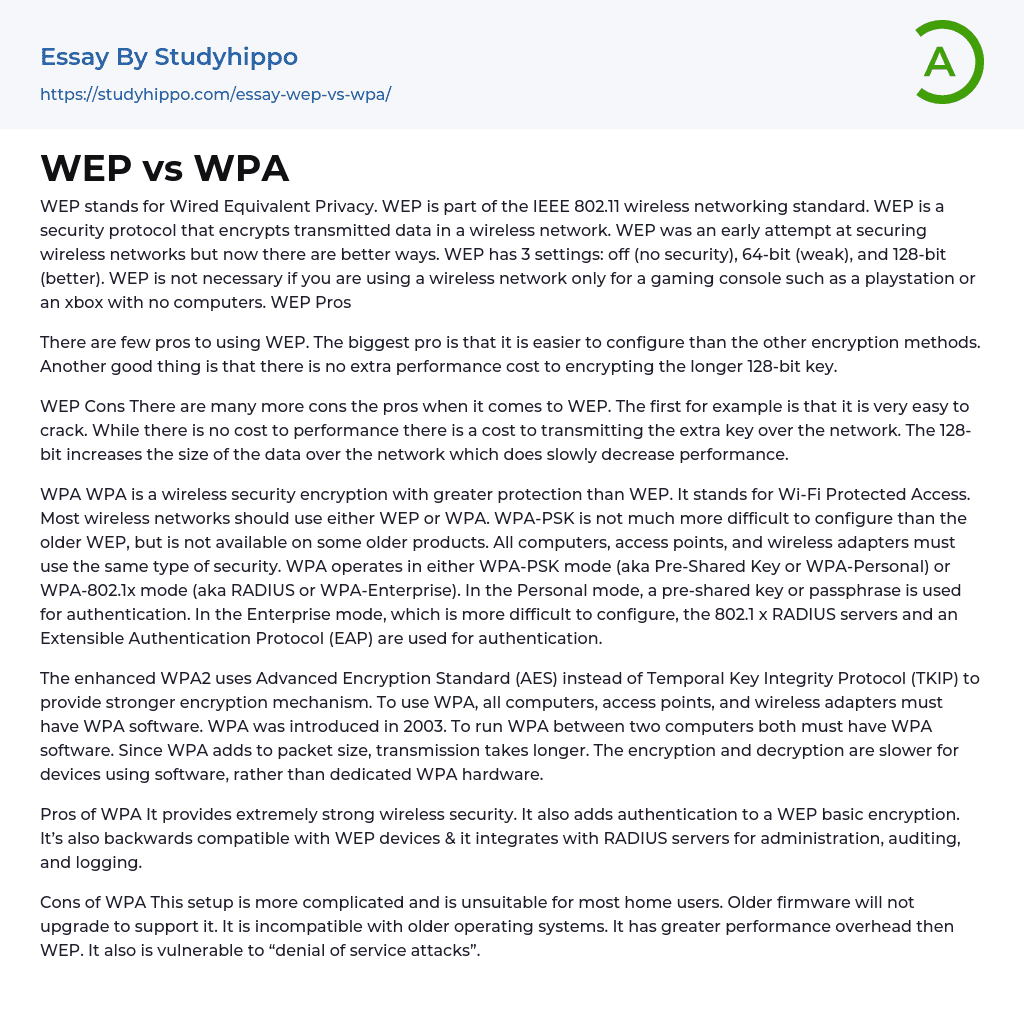Wired Equivalent Privacy (WEP) is a security protocol utilized in wireless networks to encrypt data during transmission. It is a component of the IEEE 802.11 wireless networking standard. Although WEP was an initial effort to secure wireless networks, there are now more effective alternatives available. WEP provides three choices: off (no security), 64-bit (weak), and 128-bit (better). However, if your wireless network is solely used for gaming consoles like Playstation or Xbox without any computers, employing WEP is unnecessary. Nevertheless, WEP does offer its advantages.
WEP has certain advantages, including its easy configuration compared to other encryption methods and the absence of extra performance cost when encrypting the longer 128-bit key.
The disadvantages of WEP are greater than its advantages. Its vulnerability to cracking is a significant disadvantage that ca
...n be easily taken advantage of. Although sending the extra key does have a cost, it does not impact performance. However, the use of 128-bit encryption does increase the size of data being transmitted, leading to a slight decrease in performance.
Wi-Fi Protected Access (WPA) is a wireless security encryption that provides stronger protection compared to WEP. It is crucial for all devices, including computers, access points, and wireless adapters, to utilize the same security type. WPA operates in two modes: WPA-PSK mode (also known as Pre-Shared Key or WPA-Personal) and WPA-802.1x mode (also known as RADIUS or WPA-Enterprise). In the Personal mode, authentication occurs through a pre-shared key or passphrase. In the more intricate Enterprise mode, authentication happens using 802.1 x RADIUS servers along with an Extensible Authentication Protocol (EAP).
The improved version of WPA2 uses AES instead of
TKIP for stronger encryption. To use WPA, all computers, access points, and wireless adapters need to have the WPA software installed. Both computers must have the WPA software installed in order to connect, as it was introduced in 2003. Encryption increases packet size and transmission times. Devices that rely on software for encryption experience slower speeds compared to those with dedicated WPA hardware.
WPA offers improved wireless security and authentication compared to basic WEP encryption. It also has compatibility with WEP devices and the ability to integrate with RADIUS servers for administration, auditing, and logging purposes.
WPA has various disadvantages such as being more complex and unsuitable for most home users. Moreover, older firmware cannot be upgraded to support it and it is incompatible with older operating systems. Additionally, it has higher performance overhead compared to WEP and is susceptible to "denial of service attacks".
- Android essays
- Application Software essays
- Benchmark essays
- Computer Network essays
- Computer Programming essays
- Computer Security essays
- Computer Software essays
- Cryptography essays
- Data collection essays
- Data Mining essays
- Graphic Design essays
- Information Systems essays
- Internet essays
- Network Security essays
- Website essays
- World Wide Web essays
- John Locke essays
- 9/11 essays
- A Good Teacher essays
- A Healthy Diet essays
- A Modest Proposal essays
- A&P essays
- Academic Achievement essays
- Achievement essays
- Achieving goals essays
- Admission essays
- Advantages And Disadvantages Of Internet essays
- Alcoholic drinks essays
- Ammonia essays
- Analytical essays
- Ancient Olympic Games essays
- APA essays
- Arabian Peninsula essays
- Argument essays
- Argumentative essays
- Art essays
- Atlantic Ocean essays
- Auto-ethnography essays
- Autobiography essays
- Ballad essays
- Batman essays
- Binge Eating essays
- Black Power Movement essays
- Blogger essays
- Body Mass Index essays
- Book I Want a Wife essays
- Boycott essays
- Breastfeeding essays
- Bulimia Nervosa essays
- Business essays




